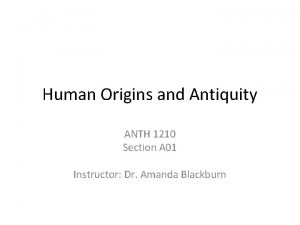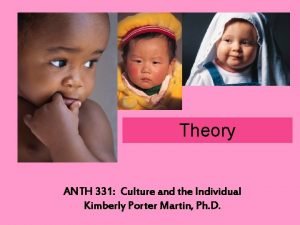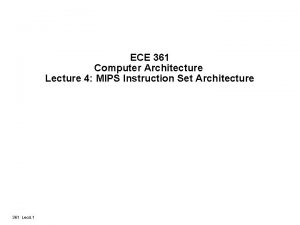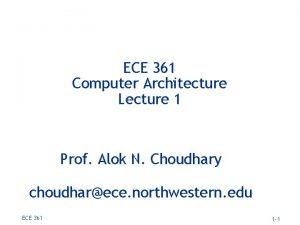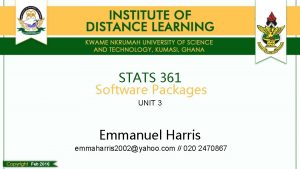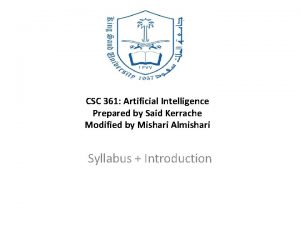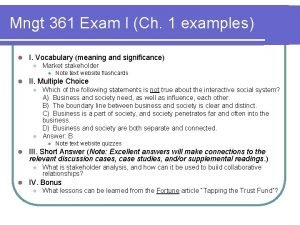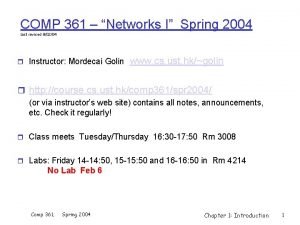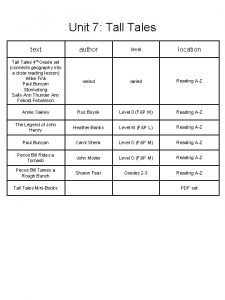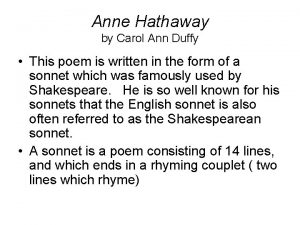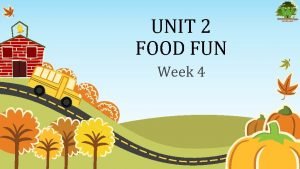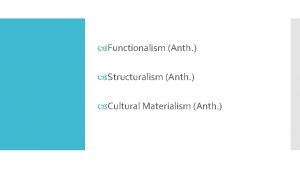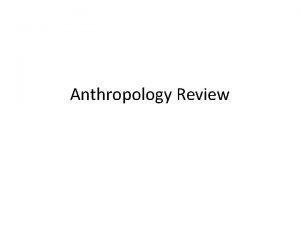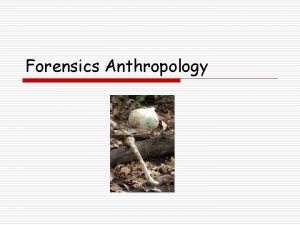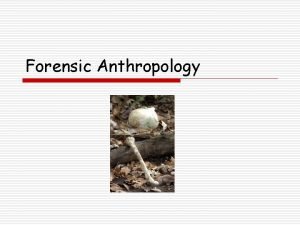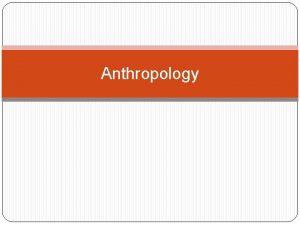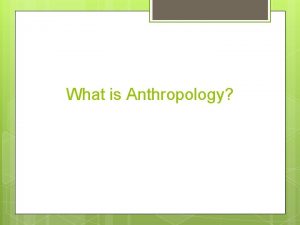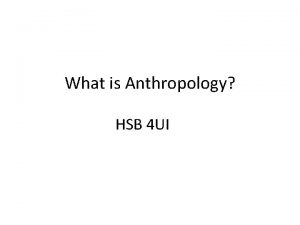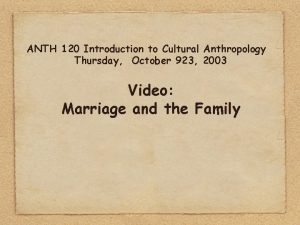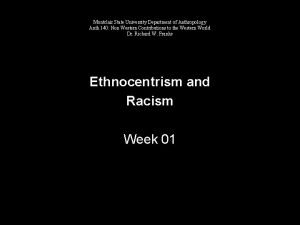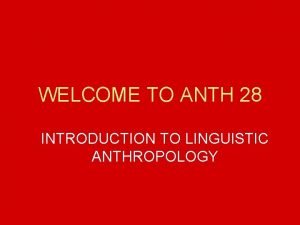ANTH 361 The Anthropology of Food Instructor Ann
















- Slides: 16

ANTH 361: The Anthropology of Food Instructor: Ann Anagnost

Reconnecting with Food • We have lost our way with food, and are struggling to find our way back. • Eat real food, not too much, mostly plants. • Don’t eat anything that your grandparents would not have recognized as food. • Ancestral Health Movement: Return to a pre-industrial diet. • Food is something deeply embedded in a cultural tradition. • But it has been hijacked by the food industry that is feeding us a menu of foods engineered for profit. • The commodification of producing, processing, and shopping (meal kits). • A whole generation of citizens who grew up not knowing where food comes from or how to cook it themselves.

Course Themes • Food and Culture: Cuisine civilized us. • Food and Social Connection: The comradery of the table. • Food and Identity (Race, Class, Gender, Ethnicity, National Belonging) • Food and Memory: Memorializing our connection with others at deep level of psychological interiority. • Food and Place (terroir, bioregionalism, locavorism) • Food and the Senses: Tasting, smelling, touching as modes of knowing.

Gastronomy • Gastro (stomach) + Nomos (law) • The term was first coined by Jean Anthelme Brillat-Savarin in his book The Physiology of Taste (1825). • "Tell me what you eat and I will tell you what you are. " • The pleasures of the table considered as a science. • Reflections on how to eat well for a sense of physical and psychological well being. • Nomos stands for order, valid and binding on those who fall under its jurisdiction; thus it is a social construct with ethical dimensions. It is a belief, opinion or point of view; it is a human invention. It is culture. • It is what we have lost with the commodification of the food chain. • Ethical Dimension: What is the good and how do we seek it? • The three philosophical domains: Ontology (What is? ), epistemology (How do we know what we know? ), ethics (What is the good? ).

Eco-Gastronomy • Gastronomy is a 19 th Century idea revived and elaborated by Carlo Petrini, founder of the Slow Food Movement in Italy. • Why do we need to understand the back-story of our food? How did we become so alienated from where our food comes from? • What forms of knowledge do we need to retrieve in order to restore a sense of well being, social connection, and being right with the world (environmental crisis). • The Slow Food ideals of “good, clean, and fair. ” (Good for you, environmentally and socially responsible. )

Gastronomy as a Holistic Field of Knowledge • • • Biological Agricultural Culinary Ecological Sensorial Historical Social Psychological Political

The Human Sensoriam • A hierarchical order in Western epistemology (ways of knowing). • Seeing and hearing as senses associated with the mind. • Tasting, touching, smelling as senses associated with the body. • An anthropology of the senses combined with an anthropology of food = a mode of knowing that connects us with the world around us in every bite.

Cooking as a Cultural Practice • It transforms nature into culture. • It transformed proto-humans into humans. • Cooking in a pot predigests our food, making for larger, more complex brains. • It connects us together in the creation of social life: the comradeship of the table. • It is something we can all do. • What happens when we no longer cook? • Cooking reminds us of what makes us human.

Four Kitchen Days • 7/3: Soul Food Meal: Collard Greens, Hoppin' John, and Spoon Bread • 7/11: Cucina Povera: Tuscan Bean Stew, Polenta, Bitter Greens Salad, Cherry Walnut Cake • 7/18: Greek Country Fare: Lentil Soup, Sourdough Bread, Rustic Salad • 7/24: Chinese Dumplings, Sweet Mung Bean Soup.

Readings • • Two books on order: David Sutton, Remembrance of Repasts. Judith Farquhar, Appetites Shorter readings available as pdfs on course website.

Three Graded Writing Assignments • Food and Identity. • Food-centered life history. • Food and ethics (What is the good and how do we seek it. )

Format for Writing Assignments • The model of writing recommended for these assignments is the 19 th-century genre of “the familiar essay. ” This is a genre that fell out of favor in the 20 th Century but as returned in the form of blogging. • This is a genre of creative writing that describes everyday experience in a highly personal way to comment on much broader issues. • It makes liberal use of the first-person pronoun. However, these writing exercises should not be written off the top of your head, they need to demonstrate that you have done the readings and that you are developing your thinking about food through thoughtful processing of the course materials and activities. • For example, you are making connections, coming up with questions, using other food cultures to reflect upon your own. • Drawing in your reflections on the cooking activities is also very desirable.

Daily Discussion Briefs • 10 out of 13 reading assignments. Two points each. • Brief paragraph that prepares a topic of discussion based on the reading. • Must demonstrate engagement with the reading to get full credit. • Pose a question, make a connection, ask for clarification on particular passage in the reading.

Video Response Exercises • Visual material used to develop themes of the course through class discussion.

How Food Shapes Our Lives • https: //www. ted. com/talks/carolyn_steel_ho w_food_shapes_our_cities • Metabolism: The energy exchanges between country and city needed to sustain life.

The Meatrix • Meatrix/Matrix • Seeing through the commodity fetish. • https: //www. youtube. com/watch? v=r. Ekc 70 zt Orc
